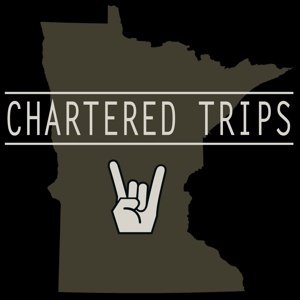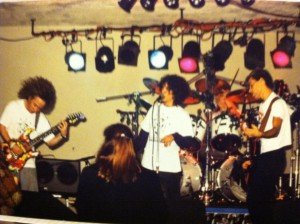 Hello everyone, Math Is Hard’s humble narrator Kyle here, and I’m very proud to announce the newest addition to the Math Is Hard family – ‘Chartered Trips’. (Subscribe via RSS)
Hello everyone, Math Is Hard’s humble narrator Kyle here, and I’m very proud to announce the newest addition to the Math Is Hard family – ‘Chartered Trips’. (Subscribe via RSS)
Chartered Trips is written by my good friend, musical compatriot, and local music nerd Colin Kerns, and focuses on Minnesota-centric albums that he loves. Colin can describe it much better than I can, so without further ado, here is Colin with a great description of what to expect in Chartered Trips. Enjoy!
Welcome to Chartered Trips.
You’re thinking it’s yet another music blog – it is! Now you’re wondering why you would want to read yet another music blog, and that’s fair – only so much time in the day, and it’s covered to death already. True enough. That said, I hope my particular approach will prove interesting to you.
If you’ll indulge me, I think it’s helpful to begin with a little history. First personal, and then more, well, historical.

Colin, headbanging on the left, in his formative rocking years.
My history, in brief: I was born and grew up in Rockford, Illinois – I came of age in the 1980s and worshipped at the altars of Westerberg, Mould, Ginn, et al, just like everyone else my age. From age ten to eighteen, I spent my time playing bass or drums for either one of my brother’s metal cover bands or one of the innumerable little punk/noise bands my friends were pulling together. In my spare time I was off in my room, teaching myself how to play guitar and write songs. By the early 90s I was playing guitar and fronting my own bands.
That went reasonably well – we opened for all sorts of super-cool bands in our time, and even got to record in a real studio with the guy who made Liz Phair’s first couple records. But in the end it didn’t really fly, so by the mid 90s I was in Madison, WI, going to college and teaching myself how to record everything on my own – all the experience playing drums and bass really started to pay off at this point. I eventually moved up here to Minneapolis and continued to write and record my own music, while very occasionally playing live as a solo act.
Eventually technology opened the door to my being able to not only record my own music but release it as well, which led me to create my current band, The Futiles. To date we’ve released two EPs, a video and a single, with another single and full-length on the way. None of it has sold much or received any airplay, but at this point in the game that isn’t nearly as important to me as the opportunity to do it. Ten years ago I couldn’t even imagine being able to do anything more than write and record my songs without a bunch of money or luck or both. I have no interest in quitting the songwriting and song-recording business, whether or not my output is appreciated or even acknowledged, because just being able to put it together and release it all on my own – to participate – is pretty much the coolest thing ever. Also, if I could have stopped writing songs I would have done so a very long time ago.
‘Dissonance’ by The Futiles
So that’s me. I’m 43 years old and doggedly pursuing my preferred avocation in a (fantastic) scene full of kids, half of whom I could – theoretically – have fathered. And I like it.
And like a lot of musicians, I’m a fan first. I will never tire of hearing a new, awesome band for the first time, and I have an ever-growing mental library stuffed full of favorite acts, records and songs. Now I’ve decided to try my hand at writing about this thing I love so much, which leads us to this blog. Let’s keep moving, shall we?
There have been far more musical acts that nobody will ever hear than there have been those who became famous to any extent. That’s simply how music works. Many musicians are happy to simply play and compose for their own satisfaction, as has been done since the first time someone decided they’d like to write a song. Many more strive for commercial success and simply fail, be it because they weren’t good enough or just unlucky. Again, that’s just the game – music has always been a far better hobby than a job. But there’s another category that interests me: those bands who managed some achievement but were deprived of a larger audience by outside circumstances.
As I write this it’s 2013, and I need but enter something like “Bandcamp” into a search engine to be presented with a plethora of music made by people whose work wouldn’t have been accessible to me just ten years ago. Or I can turn on a stream from a station like The Current that will curate things a bit more for me, if that’s my thing. It’s hard to remember that prior to, say, 2000, access to recording and distribution wasn’t within the reach of all but a few musicians. Local music stayed local, absent the intervention of large chunks of the music industry.
In the early 90s, Nirvana’s success prompted the Industry to pluck scores of scruffy young acts from all over the country, to an extent not common previously, and not seen since. It was a big move by an industry that didn’t yet realize how near its downfall was. And while it paid off handsomely for the Industry, it was a bitter lesson in business for all but a few of those acts. This came from a combination of two novel events being brought to bear by the oncoming digital age: hastened declining interest in the Grunge genre and its offshoots due to the ever-shrinking attention span of the Industry and audience, and the onset of the decline in the Industry’s influence overall. With a not very rosy future looming, the Industry contracted and jettisoned acts that weren’t likely to make much money – the time of developing an artist or band was truly over. As a result, only a small percentage of these acts ever had anything released, let alone properly promoted. What was left was a sort of black hole, consuming any product that the Industry deemed not worthy. Your hometown knew, and you probably played a wicked cool record release show and everything. And you maybe even toured, though coming across audiences that had ever heard of you was unlikely. Without an alternative means of getting those records out, though, they effectively never happened. And that sucks for us as much as those acts.
Not surprisingly, a lot of great Twin Cities musical acts got stuck in that black hole – if you were here you likely know all about them, but for those of us who weren’t lucky enough to be here they might as well not have existed. There was the Prince/Replacements/Hüsker Dü period throughout the 80’s and early 90’s, and Soul Asylum snuck in in toward the end of that, and then nothing. As a kid down in northern Illinois, there wasn’t much output we were made aware of beyond that point. Sure, we might see Run Westy Run playing openers for Soul Asylum when they came through on tour (one of Rockford’s few blessings is its prime placement right on I-90 between Chicago and Wisconsin and northward, including the Twin Cities – as a result, we got to see and occasionally even open for a lot of regional and national acts), and maybe you knew a guy who had a friend up here, but otherwise the Twin Cities music scene kind of disappeared for all we knew. Which sucks, because it never stopped being awesome. I moved here in 2000, and it still took a few years for me to be exposed to anything local and new.
My goal with this blog is to discover some of the awesomeness I missed and to share it with you. At very least I hope to add one more useful link for the next person to find. I also hope that some of you will help point me to more hidden or underrated gems, or perhaps just convince me to put one of your personal favorites under the knife.
So now you know why I’m writing the blog. Here’s a rough idea of how I hope to put it together:
Overall, I don’t intend to address any records that I don’t like. I’m not saying I won’t have a gripe here or there when it comes to specifics, but I’m not trying to critically review these records – they’re favorites and I’m just appreciating them. The plan is that I’ll do my best to adhere to what I’m calling a Process. Beyond the basic information (which will always include a way you can buy the record if at all possible), I’ll break things down into some general categories that will hopefully advance the narrative of these records and inspire some new ears to check them out.
First, each entry comes in two parts. The first part is for the section I’m calling History, which will serve both as a place where I can lay out my own reasons for writing about the record in question and as a repository for any interesting odds and ends I may be able to unearth from Twin Cities music history. I very much hope to connect with others in the process of researching each of these records, and hope to increase my own knowledge along with yours as we go along. I get talky in this part, so it’s best to put it where you can skip it if you’d like.
The second part of each entry will be a little more regimented and will discuss the following:
Songs will cover, well, the songs. Not necessarily each and every song, but anything essential to the record will be addressed.
Production will address the overall sound and sequencing of the record and any specifics that I feel are important to highlight. I am a recording engineer and a long-time liner notes junky, so this will often be the nerdier part of the proceedings. Apologies in advance (or, if you’re like me, you’re welcome). In my own best-case scenario, this section will be really long and technical – in reality, it’ll be either simply factual or the best guess I can muster.
Finally, while I’m starting with acts from the Twin Cities and older releases that I think are unknown or underrated, I’m not at all ruling out noting acts from other areas that I think are deserving or writing about a current release. If I want to write about it, I likely will. I’m not a big rules guy.
So that’s the idea. I hope to see you soon for our first Chartered Trip: The Glad Version’s Smile Pretty Make Nice.